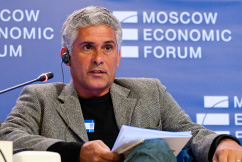
21.03.2013. Пленарная дискуссионная панель III «Экономика для человека или человек для экономики: вызовы и уроки БРИК»
Dear colleagues, after the crisis, I mean not this recent crisis, I’m talking about the crisis since the 70s, especially in after the 90s. After that crisis we have to rethink at least 2 factors of issues.
One — we could see clearly that financial liberalization process increases, financial fragility. That is the impact on fragile banking sector is weaker, where the institution of environment is strong. One could observe that the years of US in the Europe and in the opposite in Brazil bring back to us very weak. And one of the main reasons for this condition, for us the regulation of inconsistence that we have. It’s not only a problem of create functional regulation framework, but to control strict type of flows. We have to think about policies to attract desirable flows to some sectors, of course, and have capital flows. Oblation for instance with that system and similar mechanisms.
Two — to combat financial prices with austerity is in effect as the European case showed us despite of insistence of German authorities. The recession batteries drive taxes revenues in a vicious circle, increasing the total debt — this is the main problem we can see. Well, of course we have many other issues to think about after the crisis. But I think these two enough for this speech. In this sense one can observe that the government do have an important role in terms of coordination, regulation and mainly driving development, especially in the case of BRICS and other similar countries.
I was speaking about the Brazilian case, cause in Brazil we began to do different type of the government after Loolas — government combining economic policy with social policy. Even keeping the basis of the economic policy like the inflation target and something like this, Loola could change a lot the result in terms of income distribution of Brazil. What’s different after Loola? Mainly we could see 3 points. A broad income from trust fund program. Two — systematical growth of the minimum wage in real terms. And after that we could increase a lot the public investment in the financing role of the Bank, of out nation development bank of Brazil. The three main practice of this changing of our policy.
The results of this change in the policy is the inflection of the GDP growth — you can see after 2002 especially. Because of this creation of internal demand, domestic demand, because of the income process of programs and because of the minimum wage in Brazil. And in this table, in this graphic you can see that the income of the richer people is lower now than it was in the beginning of the Loola’s government. So we could improve our income distribution in Brazil.
One of the main results of this change of Brazilian economic policy is that the decreasing of the unemployment rate. Now in Brazil, as I told yesterday in my panel we have almost a situation of full unemployment which is good for us, because it’s good for the wealth. But it’s a problem to grow, to continue grow with this model, we will see this after.
This is the curve of the extreme poverty in Brazil. So you can see that its dissemination a lot and we are expecting to eliminate extreme poverty in Brazil until the end of this year. It’s promise of the government and we can see that it could happen. This is the income distribution in Brazil. You can see that as the minimum wage grows, the income distribution in Brazil gets better. So it’s a good result of the Brazilian economic policy as you can see.
And just to finish my presentation: we have problems, cause good things, we still many bad things to deal in Brazil. And I think it is a problem we can observe in any other countries like with similar structure like in Brazil. First of all, we still combine high real interest rate which overload exchange rate. It’s a problem for the exports, because now we are dependent on the export of commodities. We still export manufactures, many manufacture goods, but more and more especially because of China, we are exporting lots of commodities — especially mining and food. That’s a problem for the response in industrial sector of course.
I can add as well another problem. We still have to think about education and health care. It’s a problem in Brazil. To eliminate the poverty is a priority, but now we get to think about how to grow a continual growth again, more and more. So we have to think seriously about education and high education and the health care. More than that because of this dependence on those commodities, especially in exports, we have to think seriously too about the industrial police. And when I thought about industrial policy, I’m talking about something like electing sectors, special sectors to invest and to stimulate technology, technological innovations.
So we have to deal with real problems in Brazil and maybe for the next 10 years or 15 years at least to combine good social police with economic growth.
Thank you!

